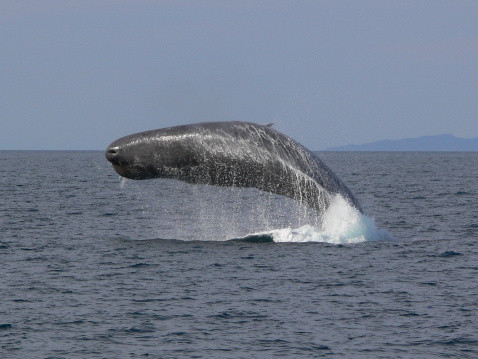Why lessons learned from the recent whale-population collapse could protect endangered sharks
A study of why whale populations declined can inform conservation strategies for sharks.

Investigating the warning signs that preceded the historic collapse of whale populations may help protect current threatened species such as sharks.
Throughout the planet's oceans, many species face the threat of overfishing. Overfishing can lead to the collapse of species, which can then take decades to recover – if they end up recovering at all. In the 20<sup>th century, whale populations dramatically declined due to overharvesting, as the animals were sought for their oil and meat.
In a study now published in the journal Nature Ecology & Evolution, scientists analysed historical data about whale harvesting, showing that early warning signs of a collapse had been present up to 40 years before.
Not only did the number of animals decline, but their body size also decreased greatly, and this, the authors argue, was a reliable predictor of the whale populations being on the verge of collapsing.
"Body size is a key trait for many species as it determines survival in harsh times as well as how many offspring they can have. So tracking how body-size changes through time gives us some idea of how healthy the population is - if the average size is declining, the population might well collapse", study lead author Christopher Clements, from the University of Zurich, told IBTimes UK.
Smaller whales
The scientists looked at data on the number and size of whales harvested from 1900 onwards which had been collected by the International Whaling Commission (IWC). In particular, they focused on analysing the information available for the blue, fin, sei and sperm whales.
They found that during the period of commercial whaling, there was a marked decline in whales' body size. This evolution was particularly striking in the case of sperm whales - their mean body size declined by up to 4 metres over a 70-year period.
These findings could be relevant to inform current conservation strategies to protect other threatened marine species such as sharks.

"A lot of species today are threatened by overharvesting, including sharks. Sharks are top predators, and they have an important role in maintaining biodiversity, but they are threatened globally, and in some places this is due to shark finning. One idea is that we could apply our findings to sharks, looking at the size of shark fins sold to act as a proxy for the sharks that remain in the sea, and to assess whether populations are close to collapsing," Clements pointed out.
The findings could also be relevant to protect the species that suffer the most from climate change - as temperatures rise, scientists know that some species can start shrinking in size. "We will thus have assess whether this shrinking in size is fast enough to indicate that a population is close to a collapse, or whether species are able to evolve fast enough to cope with the warming," Clements concluded.
© Copyright IBTimes 2025. All rights reserved.






















